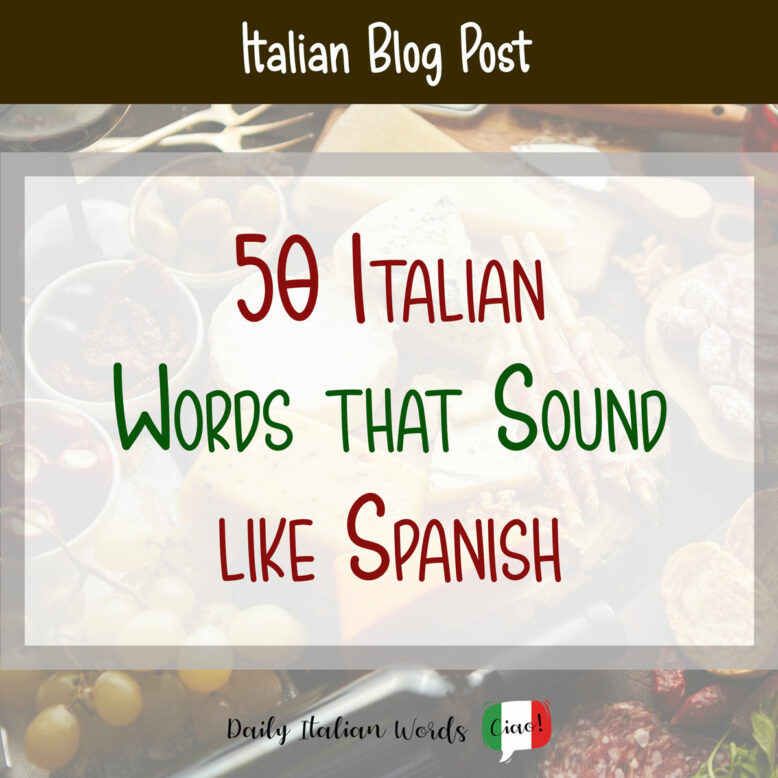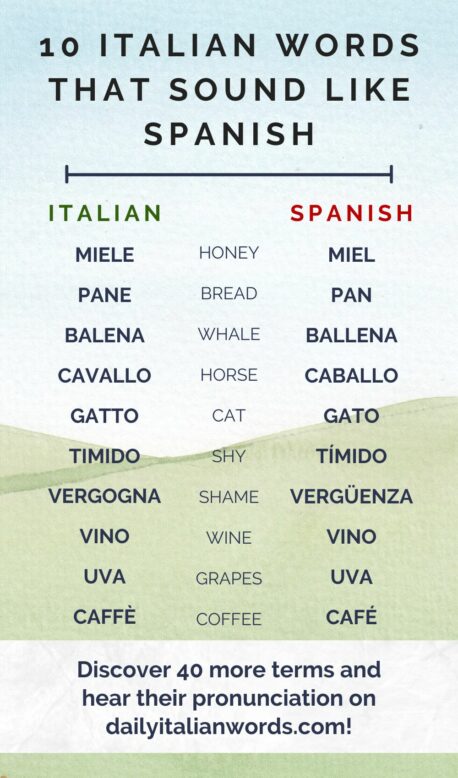Spanish and Italian are Romance languages which means that share the same roots and developed out of the ancient Latin language. Along with French and Portuguese, these languages share much of the same lexicon.
However, in many cases, the meaning of these words can be different, so it’s important not to allow yourself to be misled by their apparent similarities. Here are 50 Spanish and Italian words that look and sound the same, or almost the same, but may or may not have the same meaning. Once you’ve learned all these words, you’ll be more than ready for a month in the heart of Tuscany or a long weekend in Spain! 😉

Italian words that look and sound like Spanish
1. Vergüenza vs Vergogna
Spanish audio:
Italian audio:
These two words have the same meaning and in English can be translated as shame.
- ¿No sientes vergüenza por lo que hiciste?
- Non provi un po’ di vergogna per quello che hai fatto?
- Don’t you feel any shame for what you did?
2. Vino
Spanish audio:
Italian audio:
The divine beverage of Bacchus and the most loved drink in ancient Rome, wine can be translated with a single word in both Italian and Spanish.
- El vino es el néctar de los dioses.
- Il vino è il nettare degli dei.
- Wine is the nectar of the gods.
3. Uva
Spanish audio:
Italian audio:
- Las uvas maduras se transforman en vino.
- L’uva matura viene trasformata in vino.
- Ripe grapes are transformed into wine.
4. Té verde vs Tè verde
Spanish audio:
Italian audio:
- Me gusto tomar el té verde.
- Mi piace bere il tè verde.
- I like drinking green tea.
5. Café vs Caffè
Spanish audio:
Italian audio:
- Nunca tomo café.
- Non bevo mai il caffè.
- I never drink coffee.
6. Miel vs Miele
Spanish audio:
Italian audio:
- A John le gusta mucho la miel.
- A Gianni piace tanto il miele.
- John likes honey a lot.
7. Pan vs Pane
Spanish audio:
Italian audio:
- El precio del pan ha aumentado mucho.
- Il costo del pane è aumentato tanto.
- The price of bread has increased a lot.
8. Chocolate vs Cioccolato
Spanish audio:
Italian audio:
- El chocolate negro es muy bueno.
- Il cioccolato fondente è molto buono.
- Dark chocolate is very good.
9. Pollo
Spanish audio:
Italian audio:
In this case, although the word means the same thing, the double -ll is read differently in the two languages. Indeed, in Italian the double l is pronounced as a longer l whereas in Spanish the pronunciation of the same word is /’po ʎ o/. To better understand this, difference check out our article about the differences between Spanish and Italian.
- No como pollo porque soy vegetariano.
- Non mangio il pollo perché sono vegetariano.
- I don’t eat chicken because I’m a vegetarian.
10. Salmón vs Salmone
Spanish audio:
Italian audio:
- El salmón nada en el río.
- Il salmone nuota nel fiume.
- The salmon swims in the river.
11. Patata
Spanish audio:
Italian audio:
- La patata es un tubérculo.
- La patata è un tubero.
- The potato is a tuber.
12. Ballena vs Balena
Spanish audio:
Italian audio:
- La ballena es el animal más grande del mundo.
- La balena è l’animale più grande al mondo.
- The whale is the biggest animal in the world.
13. Elefante
Spanish audio:
Italian audio:
- El elefante indio es más pequeño que el africano.
- L’elefante indiano è più piccolo di quello africano.
- The Indian elephant is smaller than the African one.
14. Gallo
Spanish audio:
Italian audio:
- Vi un gallo en el jardín de Enrico.
- Ho visto un gallo nel giardino di Enrico.
- I saw a rooster in Enrico’s garden.
15. Gallina
Spanish audio:
Italian audio:
- La gallina puso un huevo.
- La gallina ha deposto un uovo.
- The hen laid an egg.
16. Caballo vs Cavallo
Spanish audio:
Italian audio:
- Montar a caballo puede ser peligroso.
- Andare a cavallo può essere pericoloso.
- Riding a horse can be dangerous.
17. Toro
Spanish audio:
Italian audio:
- En España el toro es un símbolo nacional.
- In Spagna il toro è un simbolo nazionale.
- In Spain the bull is a national symbol.
18. Foca
Spanish audio:
Italian audio:
- La foca descansa en la playa.
- La foca si riposa sulla spiaggia.
- The seal rests on the beach.
19. Gato vs Gatto
Spanish audio:
Italian audio:
- El gato persa es un animal increíble.
- Il gatto persiano è un animale stupendo.
- The Persian cat is an amazing animal.
20. Vaca vs Vacca
Spanish audio:
Italian audio:
- Mi abuela tenía una vaca cuando vivía en el campo.
- Mia nonna aveva una vacca quando viveva in campagna.
- My grandmother had a cow when she lived in the country.
21. Fotógrafo vs Fotografo
Spanish audio:
Italian audio:
- Debemos encontrar un buen fotógrafo para la boda.
- Dobbiamo trovare un buon fotografo per il matrimonio.
- We must find a good photographer for the wedding.
22. Cantante
Spanish audio:
Italian audio:
- El cantante de Maneskin es realmente genial.
- Il cantante dei Maneskin è proprio figo.
- The singer of Maneskin is really cool.
23. Egoísta vs Egoista
Spanish audio:
Italian audio:
- Ese hombre es tan egoísta que sólo piensa en sí mismo.
- Quell’uomo è davvero egoista, pensa solo a sé stesso.
- That man is such an egoist, he only thinks of himself.
24. Lento
Spanish audio:
Italian audio:
- La tortuga es un animal muy lento.
- La testuggine è un animale molto lento.
- The tortoise is a very slow animal.
25. Fresco
Spanish audio:
Italian audio:
- El queso mozzarella es fresco. Lo compré hoy.
- La mozzarella è fresca, l’ho comprata oggi stesso.
- The mozzarella cheese is fresh, I bought it today.
26. Duro
Spanish audio:
Italian audio:
- El pastel se quemó en el horno y se volvió tan duro como una roca.
- Il dolce si è bruciato in forno ed è diventato duro come una pietra.
- The cake got burnt in the oven and became as hard as rock.
27. Triste
Spanish audio:
Italian audio:
- Es muy triste que Antonio haya perdido su trabajo.
- È così triste che Antonio abbia perso il lavoro.
- It’s so sad that Antonio lost his job.
28. Tímido vs Timido
Spanish audio:
Italian audio:
- Ese chico era muy tímido.
- Quel bambino era veramente timido.
- That boy was really shy.
29. Serio
Spanish audio:
Italian audio:
- El padre de John cree que esto es un problema bastante serio.
- Il padre di John crede che questo sia un problema piuttosto serio.
- John’s father believes this to be quite a serious problem.

Spanish and Italian False Friends
30. Burro
Spanish audio:
Italian audio:
This word can trip you up, especially at mealtime. In Italy, when you are sitting at the table, you can ask for some butter by saying: Posso avere del burro per favore? (May I have some butter please?). However, in Spain, burro means donkey, so keep that in mind if you don’t want the waiter to think you’ve lost your mind.
31. Caldo
Spanish audio:
Italian audio:
This word in Spanish means broth, as in the kind of soup eaten during the cold season. In Italian, on the other hand, it is an adjective used to describe something warm or hot.
32. Camino
Spanish audio:
Italian audio:
This is the Italian word for chimney, which in Spanish is chimenea. In Spain, camino means path, way, little street, direction or track. Both have the same spelling but refer to pretty different things.
33. Carta
Spanish audio:
Italian audio:
Another cognate word is carta, which in Italian refers to a material derived from trees: paper, or just a sheet of paper. In Spanish, on the other hand, this term is used for both the mail and a menu. A curiosity for tourists: in Spain the daily menu in restaurants is called the same as in English, menu. But the fixed one is the carta.
34. Cura
Spanish audio:
Italian audio:
The difference in meaning of this word is huge. While in Italy it indicates a treatment or a remedy to help one heal from a virus or a sickness, in Spain, cura means priest, the clergyman who performs religious ceremonies.
35. Largo
Spanish audio:
Italian audio:
This word is pretty misleading, especially for native speakers who use this term daily. Largo in Italian means wide or large, which in Spanish translates as ancho. In Spain, largo means long which in Italian is lungo.
36. Pelo
Spanish audio:
Italian audio:
This term means hair in Spanish while in Italian it refers to body hair. For this reason, if you want to have your hair cut in Italy, remember to say capelli and not peli. Otherwise, they will wax your body hair.
37. Pronto
Spanish audio:
Italian audio:
This is the word used in Spain to say soon or early. It means ready for Italians and it’s also used to express the readiness of a service, as in the word pronto soccorso (emergency room).
38. Topo
Spanish audio:
Italian audio:
This word in both languages indicates an animal. But in Italy it refers to a mouse, while in Spain it means mole.
39. Rata
Spanish audio:
Italian audio:
Although the word is written the same way in the two languages, this term in Italy is a noun that means instalment. On the other hand, rata in Spanish is rat, the filthy rodent that lives in city.
40. Vaso
Spanish audio:
Italian audio:
Vaso in Spanish means glass. You can ask for a glass of water saying: un vaso de agua por favor! In Italy however it indicates a vase or a pot in which you keep plants or flowers.
41. Ciao
Spanish audio:
Italian audio:
In this case, the meaning is the same. What varies between the two languages is that in Spanish you use it only to say goodbye. In Italy, by comparison, ciao is the universal way to say hello and goodbye.
Spanish and Italian words that look similar, but have a different meaning
Lastly, we have a list of Italian and Spanish words that, unlike the previous terms, show some variation in spelling, but phonetically sound nearly identical.
42. Aceite vs Aceto
Spanish audio:
Italian audio:
These two words may look alike, but the first one is the Italian term for vinegar, while in Spanish, aceite is oil, such as olive oil: aceite de oliva. Vinagre is the Spanish word for vinegar.
43. Cámara vs Camera
Spanish audio:
Italian audio:
Although these words may seem identical, given that the spelling is the same except for the vowel in the second syllable and the accent on the a, one shouldn’t assume they have the same meaning in both languages. The Italian word camera indicates a room. It can be any kind of room such as a hotel room (camera d’albergo) but also a bathroom or bedroom: camera da bagno and camera da letto. In Spanish, cámara means camera, as in the photographic device.
44. Contestar vs Contestare
Spanish audio:
Italian audio:
The Italian word, contestare, means to challenge or to contest. This is a verb in Spanish too, but in the Iberic peninsula it indicates the act of answering to something. Mostly, it is used to say that you answer an email (contestar a la carta), the phone (contestar al teléfono) or the intercom (contestar al intercomunicador).
45. Equipaje vs Equipaggio
Spanish audio:
Italian audio:
Equipaggio in Italian means a crew of professionals that work on a ship or the cabin crew (equipaggio di bordo) on an airplane. Equipaje in Spanish indicates a suitcase, baggage or luggage.
46. Guardar vs Guardare
Spanish audio:
Italian audio:
In Spain, guardar means to secure and to put something in a safe place. While guardare in Italian indicates the action of seeing or looking at someone or something.
47. Embarazada vs Imbarazzata
Spanish audio:
Italian audio:
Some years ago, a very famous Italian singer, Laura Pausini, fell into this trap while taking part in an interview in Spanish. She used the word embarazada, which in Spain means pregnant, trying to say what in Italian is to be embarrassed – imbarazzata. You can imagine what a huge stir it generated at the moment. Afterwards she was told about the mistake and had to clear up the confusion.
48. Oficina vs Officina
Spanish audio:
Italian audio:
This is a common mistake among native speakers. In Italian officina is a workshop or a garage, generally related to the automotive industry. In Spanish, oficina is a work office.
49. Salir vs Salire
Spanish audio:
Italian audio:
These two words are similar in pronunciation yet very different in meaning. Salire in Italian means to go up or to climb to the top of a mountain or staircase. In Spanish salir means to go out to do something.
50. Subir vs Subire
Spanish audio:
Italian audio:
Finally, let’s end this massive list with these two words. The first one, subire, in Italian means to suffer, to undergo, to experience something unpleasant. By contrast, subir in Spanish means to go up or to climb, like the verb salire in Italian.
About the author: Fabio Guarino
As a Linguist and Language Specialist, working as a Freelance Content Writer and SEO Marketer allows me to combine my passions and interests with my career. My favourite thing about working with languages is playing with words. And this is something I’ve always dreamed about since I started to wander the globe and study languages.

Fabio Guarino is a Linguist and Language Specialist who operates as a Freelance Content Writer and SEO Marketer. He considers himself fortunate to be able to blend his passion for his native language, Italian, along with English and Spanish, with his career.


